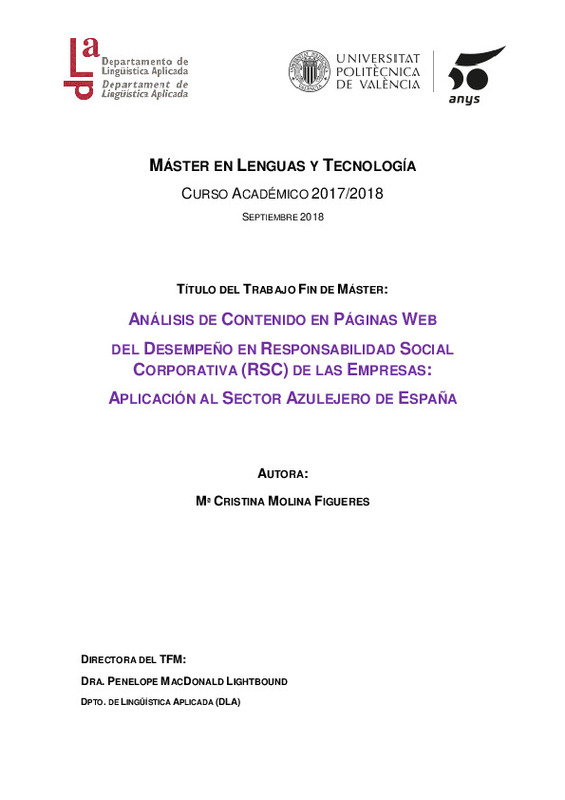|
Resumen:
|
[ES] El presente trabajo fin de máster (TFM) es de carácter empírico y aborda el análisis de contenido en páginas web como herramienta de comunicación del desempeño en los ámbitos social y medioambiental o de sostenibilidad, ...[+]
[ES] El presente trabajo fin de máster (TFM) es de carácter empírico y aborda el análisis de contenido en páginas web como herramienta de comunicación del desempeño en los ámbitos social y medioambiental o de sostenibilidad, de la responsabilidad social corporativa (RSC) en las empresas del sector azulejero de España.
Se parte de que la RSC debe ser comunicada para que sea efectiva, y de que las páginas web son los instrumentos de comunicación más cuidados y efectivos de las empresas. El objetivo es identificar e investigar el lenguaje utilizado que refleja el compromiso de la empresa con la RSC. Para ello, mediante el análisis de una muestra de 40 de las 165 empresas azulejeras que componen el sector español, se clasifican y determinan secciones, se generan plantillas específicas que se cumplimentan extrayendo minuciosamente los datos de sus páginas web. Contando con la colaboración de expertos en RSC y lingüística se valida el contenido de las plantillas, se analiza la materialidad de los contenidos sobre RSC y se aplican en el análisis de contenido técnicas de lingüística de corpus utilizando la herramienta WordSmith (Scott, 2008).
Se concluye que, pese a que la mayoría de empresas manifiestan su compromiso con la RSC en cuidadas páginas web utilizadas actualmente como instrumentos de comunicación efectiva, en los primeros resultados únicamente 6 empresas reflejan suficiente desempeño en RSC en el contenido de sus páginas web. Y de esas 6 al integrar la responsabilidad corporativa a través de la materialidad, a juicio del experto en RSC se obtiene que solo 2 de ellas, sí comunican contenidos materiales de RSC, cuentan con planificación en RSC, demuestran entender el concepto y aplican los principios de la RSC. En el análisis de contenido lingüístico de las páginas web, los resultados coinciden exactamente en las mismas 2 empresas, por ser las que destacan a través del lenguaje en el empleo de una terminología específica vinculada a la RSC. Por tanto, se demuestra que el análisis lingüístico permite identificar a las empresas que mejor comunican su desempeño en sostenibilidad.
[-]
[EN] The present master's thesis is of an empirical nature and focuses on the analysis of the content of corporate Web pages in the tile sector in Spain with the aim of investigating whether these companies manage to ...[+]
[EN] The present master's thesis is of an empirical nature and focuses on the analysis of the content of corporate Web pages in the tile sector in Spain with the aim of investigating whether these companies manage to communicate their commitment to Corporate Social Responsibility (CSR) performance (social and environmental/ sustainability dimensions), and how this is done.
The main idea is that for CSR to be effective, it must be addressed explicitly through the different means of communication that companies have available nowadays, for instance, with carefully-written web pages. The aim, therefore, is to identify and investigate the language used by the tile sector companies which show their commitment to CSR. With this objective in mind, a total of 40 of 165 companies¿ web pages were classified and specific templates designed in order to extract the information required for the analysis. With advice from experts, above all, in the field of RSC (to validate both the web content in the templates and the materiality study), and linguistics, a content analysis of the web pages was carried out using corpus linguistics methodology, namely with WordSmith Tools (Scott 2008).
It was found that although the majority of the companies seemed to visualise their commitment to CSR in their webs, this was done only partially and in a more superficial way and, in fact, only 6 of the companies were shortlisted as being more representative of carrying out CSR policies. However, in a second phase of the research, the integration of CSR when applying the concept of materiality was examined and in view of the expert, CSR was only genuinely applied in 2 of these 6 companies, that is, only 2 planned and carried out their company activity including all the principles of CSR. In addition, and regarding the linguistic analysis with WordSmith, the same 2 companies were found to use more specific terminology related to the communication of sustainability performance in their web pages, which showed that the linguistic analysis was valid for identifying those companies that successfully transmit their commitment to CSR.
[-]
|







